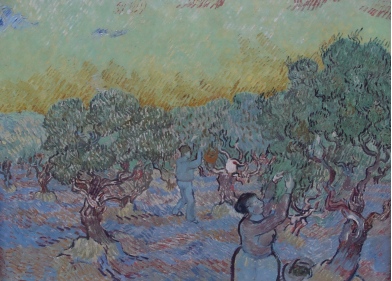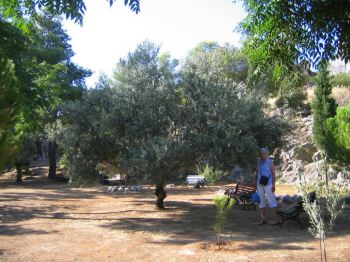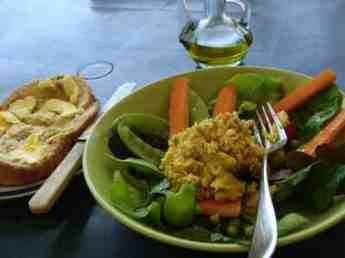Oleocanthal
Oleocanthal in olives and the oil, enjoyed daily enables you to appreciate significant levels of anti-inflammatory protection against joint, muscle and organ disease.
In the original of this fine piece of art found in the Kruller-Muller museum in the Netherlands you'll find a V in lower right corner; Vincent, of course. Harvesting olives is labour intensive.
 Olive orchard by Vincent van Gogh
Olive orchard by Vincent van GoghMuch has been made in the scientific literature as to just how dangerous anti-inflammatory drugs are; and in particular if you are taking more than one for any length of time.
One in six hundred of the elderly taking NSAIDs die from a gastric bleed, directly caused by these powerful medications.
The key is to enjoy low levels of anti-inflammatory foods every single day to give your body protection against these painful diseases; the oleocanthal in cold pressed extra virgin olive oil is one of the reasons why the Mediterranean folk are so much healthier.
Seed oils are high in inflammatory omega-6, and are solvent extracted at high temperatures. The fats in olives and avocados are obtained from the fruit without these damaging food industry techniques; they are cold pressed.
In addition olives are neutral in relation in omega 6 and 3; they do not raise the ratio and are not inflammatory like most seed oils are. Canola from rape is the exception but there lie other problems.
Olives are rich in oleic acid, named in fact after the Queen of the Mediterranean, which forms a large part of the covering of most nerves in the body; hence our interest as chiropractors. Without a healthy myelin sheath, as it is called, they are unable to conduct.
You've probably heard of the demyelinating diseases. Whilst these autoimmune conditions like that which killed Lou Gehrig, an American baseball player and Joost van der Westhuizen from South African rugby are not well understood, inflammation and a diet deficient in oleic acid and oleocanthal play a vital part.
This page was last updated by Dr Barrie Lewis on 19th January, 2023.
Oleocanthal
A holiday in Greece to discover the essence of the Mediterranean diet and the power of oleocanthal first hand did us a power of good.

Oleocanthal is the phytochemical that gives olive oil the burn in the back of your throat; if it's ever so sweet and smooth it is probably highly refined and perhaps tastes better but has lost its nutritional value.
Well it will still have the oleic acid but its real anti-inflammatory properties are lost.
Chemically oleocanthal is a phenol which means it has an OH group attached to an aromatic ring; what's unique is that the H atom is loosely bonded giving them their antioxidant properties. This is why, for example, extra virgin olive oil is so central to the heart, stroke and diabetes story; diet alone accounts for nearly half of the deaths.
Many of the important dietary phytochemicals are phenols; for example, eugenol in sweet basil, resveratrol in avocados and quercetin in onions. The lignans in flaxseed, kaempferol in your dark-green leafy vegetables and bioflavonoids in many coloured foods are not dissimilar.
It's their ability to transfer a hydrogen atom, or electrons that gives them their unique antioxidising properties.
Cyclo-oxygenase or COX, is an inflammatory enzyme found in the body; oleocanthal is an inhibitor of this toxic substance. It is credited with the low levels of Alzheimer's and heart disease in those enjoying the Mediterranean type diet.
There was much excitement in the pharmaceutical world when they discovered medications like Vioxx were also Cox inhibitors; they were called "wonder drugs" and spelt the end of the inflammation of arthritis. Sadly it soon became apparent that they had severe side effects and many have been withdrawn from the market; and others like Celebrex taken with great caution.
But oleocanthal acts in exactly the same way as NSAIDS by blocking the COX enzymes but without the side effects. By inhibiting these inflammatory chemicals in degenerating joint cartilage it is beneficial in all forms of arthritis; and hence our interest as chiropractors.
It is unique to olive oil by the way and found in no other foods; and only in those with the burn in the back of the throat. That's the sign of extra virgin.
Why in any case would you take these dangerous, expensive drugs when you can get the same benefit from olive oil?
Oleocanthal has also been shown in much of the literature to inhibit many forms of tumours associated with inflammation, again by blocking the COX enzymes.
It also inhibits the inflammation associated with atherosclerosis, the major cause of high blood pressure; and related heart and brain disease.
Researchers in France, reporting in PLOS declare that a diet high in extra virgin olive oil reduces stroke by 39% and cardiovascular disease by 48 percent in comparison with a low fat meal plan.
Further studying the most common form of age-related blindness, macular degeneration, they found that regular use of olive oil was significantly associated with decreased risk of AMD; but there was no beneficial effect from any of the other fats consumed such as butter, margarine or the omegas.
The carotenes lutein and zeaxanthin are also vital substances in the phytochemical foods like kale, spinach and corn for the prevention of age-related macular degeneration.
Purity
We humans are obsessed with purity, sweet and smoothness; I first came up against this as a child. We have a long tradition of beekeeping in the family, and we boasted that our honey was pure; it was strained through seven layers of muslin. It was a serious mistake.
In similar vein, look for olive oil that is thick and murky; unprocessed means there's a lot more oleocanthal. It must burn in the back of the throat.
Yes all the impurities like bee's wings were strained out but in order to achieve this the honey had to be heated as it was too viscous; so the very important pollen was removed too. In short it was spoiled in the process of making it pure.
Today we specialise in lightly-filtered raw honey to retain the pollen and not damage important enzymes.
German researchers have found that unprocessed raw honey from hobbyist beekeepers surprisingly has a low glycemic index; that from commercial bottlers is very high GI.
We see the same with flour where the bran has to be removed to make pure cake flour. With citrus juice where the limonin is extracted for OJ because of its sour flavour; and the oleocanthal from olive oil because of the burning taste.
Worse the vitamins are removed and, in the case of E in wholewheat and C in freshly-squeezed orange juice, it means progressive frailty syndrome that scientists have found has its roots in the deficiency of four important substances that are refined out of our food[1].
These plant chemicals are vital for sparkling good health; the refining processes of the food industry extracts many of them, often selling them back to us in the form of expensive supplements.
To find links to topics in bold like raw honey and frailty syndrome above and phytochemical foods below use the site search function in the navigation bar on your left.
Phytochemical foods
Let's spend a few moments looking at those other phytochemical foods that are equally important to oleocanthal.
Firstly the lignans which are found in bran and many seeds such as flax and sesame; they are estrogen-like substances that compete at the hormone sites in the breast and prostate, giving protection against two of the very worst tumours that afflict humans.
Then there's the limonin in all citrus fruit but particular lemons giving them their sour taste. It is a powerful antioxidant giving protection to the nerves and many malignant tumours but especially in the mouth and colon.
Limes are a rich source too.
Growing lemon trees should lie near the top of the list of priorities when moving into a new home.
There are dozens, nay hundreds, so I'll mention just two more; allicin in the onion family and particularly garlic, and choline in eggs and greens like broccoli.
Along with extra virgin olive oil we try very hard to get these other phytochemical foods into our diet daily. It really is important to know something of choline food sources and allicin benefits. There's only one alternative; enjoy a wide range of coloured foods and you are reasonably assured of obtaining the majority of them.
But the problem remains that the average Western diet is woefully short on lignans and choline, for example. It's no coincidence there is an epidemic of breast and prostate tumours; and anti-inflammatory drugs remain amongst the most commonly prescribed medicines.
Hippocrates, the father of modern health care, said it all; let your food be your medicine. We give him much lip-service but totally ignore his advice in the main.
This olive garden salad dressing is on our menu virtually daily; eschew those high in seed oils. Or simply drizzle extra virgin over your greens with a squeeze of lemon or lime juice. Add a spoonful of homemade hummus, have a slice of 100% wholemeal bread and you have all four of those four vital nutrients that prevent the weakness, diminished vitality and weight loss of frailty.
It takes only five minutes to make your own hummus, once you have located the chickpeas and tahini, a sesame seed spread. It too is rich in oleocanthal.
Make this chickpea garbanzo bean dip twice a week; without preservatives it doesn't keep.

This may look a little like a dog's breakfast but it has all four of the anti-frailty vitamins; tastes good too.
- Olive garden nutrition
- Lutein benefit. Web: https://tinyurl.com/nh9sxasx
- Zeaxanthin macular degeneration
When browsing these links use right click and "Open Link in New Tab", or you may get a bad gateway signal.
Did you find this page useful? Then perhaps forward it to a suffering friend. Better still, Tweet or Face Book it.
